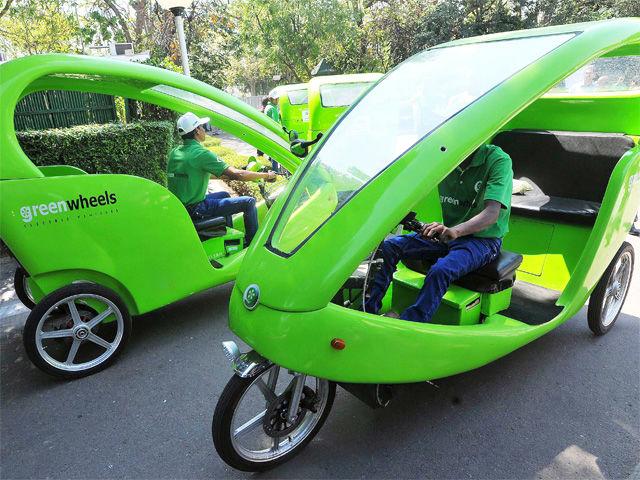E-rickshaws provide a simple, easy and pollution-free solution. E-autos and E-bikes and E-scooters too are slowly picking up. A start-up has come up with a bright idea to have Battery Swap Stations that is expected to revolutionise the use of electric vehicles for last mile connectivity, especially in major cities. Here’s a report, for Different Truths.
In a decade or two, nearly 50 percent of 1.3 billion people in India will live in urban areas and transportation is perhaps going to be a major hurdle, particularly in major cities, which are already choked. Lately, there is a new dimension to this problem, that is, pollution to which vehicles are a major contributor. It is medically proven that Indian children have 30 percent less stamina because of pollution, especially in cities like Delhi, where air pollution is far beyond safe limits during winter.
So experts have already started working on how to tackle this problem. There is a crying need to fast-track development of public transport and this is one of the reasons that metro is being expanded in a big way in major cities, but last mile connectivity is critical to the success of public transport and this is perhaps a major hurdle, for which the solution could be electric vehicles. Presently electric vehicles have not caught on to the desired level because of the prohibitive cost of batteries and the need for frequent and time-consuming charging.
E-rickshaws provide a simple, easy and pollution-free solution. But its full potential has not yet been fully realised even though it is slowly catching on in Delhi and several north Indian states replacing cycle rickshaws. In the matter of a few years, E-rickshaws have grown to 15 lakhs and are expected to double by 2020. E-autos and E-bikes and E-scooters too are slowly picking up. Though the e-vehicle technology is simple and cost-effective, the cost of the battery is quite high and also it requires frequent charging, which necessitates the creation of huge infrastructure. For example, E-rickshaws, which can be manufactured in a small shed, cost a little over Rs one lakh but the lithium battery in it costs Rs 60,000. Lead-acid batteries may cost much less at Rs 20,000 but its life is one-tenth, besides more frequent charging. Apart from setting up charging stations, which are expensive, the high battery cost makes the operation of e vehicles not that attractive.
To overcome this problem, a start-up has come up with a bright idea to have Battery Swap Stations that is expected to revolutionise the use of electric vehicles for last mile connectivity, especially in major cities. This will virtually reduce the cost of e-rickshaws by half as battery no longer needs to be owned but leased for a rent on a daily basis. The number of E-autos in the country may be in thousands as against half a million petrol, diesel, and CNG autos. Because of the emergence of swap stations, use of E-autos is going to grow manifold and within a year or two, the majority of autos in the country would become E-autos. This is because, without battery, which will now be leased out, the cost of e-autos would drastically come down.
The start-up, Lithion Power, is perhaps the first to launch Battery Swap Stations in the country. To begin with, It has established battery swap operations in Delhi for public electric vehicles, particularly E-rickshaws. The swap stations will provide batteries for e-autos and e two-wheelers as well. The company has established five stations in North and North West Delhi and by end of March, the company proposes to have 20 such stations.
Unveiling the company’s plans, director of Lithion Power Piyush Gupta indicated that by 2019, Lithion customers will not be more than 2 km away from a Lithion swap station in NCR. The company proposes to set up at least 500 swap stations in the capital. It will be setting up more than 10,000 such swap stations in the country. If this model is successful the company proposes to set up such stations in Indonesia, Bangladesh, Sri Lanka and perhaps several countries in Africa.
Gupta believes that electric vehicles will be the predominant mode of transportation by 2020. This is because of economics. EVs would be cheaper to manufacture and operate, besides solving urban pollution problems. With economies of scale operating, the cost of e-vehicles, as well as batteries, will fall further as in the case of solar power, mobile phones and LED bulbs in the country.
There are at present only about half a million E-two wheelers in the country. This is now expected to grow exponentially to several million in the next few years with the availability of leased lithium batteries in every nook and cranny of the country.
“Lithion Power has commercialised a model which simultaneously solves an economic need for its customers and a societal need, without relying on funding from the government. We believe we are the first EV company in the world to make a sustainable model. Lithion aims to become the largest supplier of power to electric vehicles worldwide,” Gupta claimed.
The pollution from two-wheelers contributed to nearly half of vehicular pollution in Delhi and hence E two-wheelers, E autos, and E rickshaws will make a big difference, besides being much cheaper than fossil fuel-driven vehicles.
This will also create a huge opportunity for the manufacture of lithium batteries in the country with more battery swap stations dotting all over. With swap stations being set up, E buses and commercial vehicles too will become a reality in major cities, providing a cheap solution to public transport problem plaguing most cities. Just as mobile telephony created huge employment, battery swap stations too have tremendous potential for job creation.
K R Sudhaman
©IPA Service
Photo from the Internet
#ERikshaw #BatterySwapStations #Indonesia #Bangladesh #SriLanka #LithionPower #IPA #DifferentTruths






 By
By
